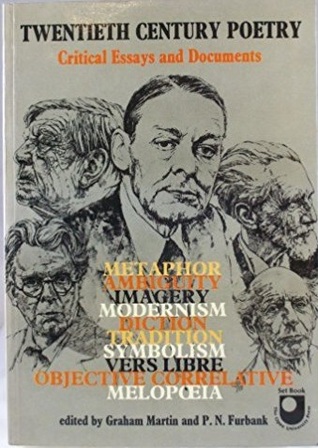

 |

|

The average rating for Twentieth century poetry based on 2 reviews is 4 stars.
Review # 1 was written on 2015-01-20 00:00:00 Alan Mcculloch Alan MccullochI first read this book as a secondary school student in the later 1970s and remember the pleasure of wandering though it, learning about Poets who were no part of any school syllabus. Published in 1975 and reprinted in 1979, it was designed as a text book for the Open University. As such it is a wide ranging collection of essays and documents. The book is divided into two sections: the Language of Literary Criticism and Sections on individual poets. The first section covers a range of topics from "the Language of Literary Criticism" via "Poetry and Belief" to "Modernism". The contributions are taken from a who's who of literary criticism and poetry of the first half of the twentieth century: Leavis, Kenner, Empsom, Richards, Eliot, and Yeats, Eliot, Pound, Thomas (Dylan) Auden and Winters. As such it provides a good overview of the arguments and critical discussions up to the 1970s when this book was published. It also records ambivalence towards such 'movements' as "Modernism" not only in Larkin's well known criticism, presented here in an interview with Ian Hamilton, but in other other responses, such as Phillip Hobsbaum's "The Road not Taken": 'Forty years afer its publication it is not hard to see that "The Waste Land" whatever its merits has prompted some of the worst writing in English'. and David Craig's "The defeatism of the 'Waste Land'" which begins: T.S.Eliot's 'The waste Land' is one of the outstanding cases in modern times of a work which projects a n almost defeatist personal depression in the guise of a full, impersonal picutre fo a society'. Part two provides critical essays on a variety of writers: Hardy, Pound, Eliot, Yeats, Auden, Brecht, Thomas (D), Hugh Macdiarmid, Larkin, Lowell (Robert) Ted Hughes and Sylvia Plath. The choice of names dates the book, only one female poet. Yeats and Thomas (Dylan) are allowed a piece about their own work, Thomas's "Notes on the art of poetry" is the piece I most remember reading as a student. It ends with the once famous:' The joy and function of poetry is, and was, the celebration of Man, which is also the celebration of God'. While rereading this essay was worth the price of the book the real find for me this time round are the two essays on Thomas Hardy. The date of the book is, I think, significant. It predates the intrusion of "theory". This has the immediate advantage that all the articles are written as though the writer wanted to communicate with the reader. Even if that reader is but an interested secondary school student. How quaintly old fashioned, and how quaintly old fashioned to produce a book which assumes poetry is worth writing and reading without all the ludicrous baggage of 'theory' which tended to side line both poet and poem. The book was, for an A level student in 1979, a treasury of information and opinions. I think it still is a fine collection for anyone interested in the poetry of the twentieth century as long as the reader allow for the bias of the time. The Editors have added explanatory footnotes so the inevitable references to forgotten arguments or obscure poems are explained. I think the blurb is correct: 'This anthology of critical writings will be useful to anyone interested in the development of modern poetry. It gathers together in one volume both "classic" modern critical texts and much important material not easily obtainable outside specialist libraries'. |
Review # 2 was written on 2017-06-17 00:00:00 Thomas Law Thomas LawThough this is a collection of essays, and most of them leaning very heavily into a personal narrative where Hass describes his relationship with a poet's work, I felt there was a larger argument at work in the book. It seems to me form is an organic structure for Hass, and it grows out of a poet's experiences and his identity. This doesn't mean that he surrenders himself to some touch-feely version of how a poem ought to be, Hass is as strict in his analysis of sonics, and rhythms, and meter. It does mean that these elements take on a character unique to a really good poet. |
CAN'T FIND WHAT YOU'RE LOOKING FOR? CLICK HERE!!!